Unit 1 Living well Learning and Language 课件(46张)
文档属性
| 名称 | Unit 1 Living well Learning and Language 课件(46张) | 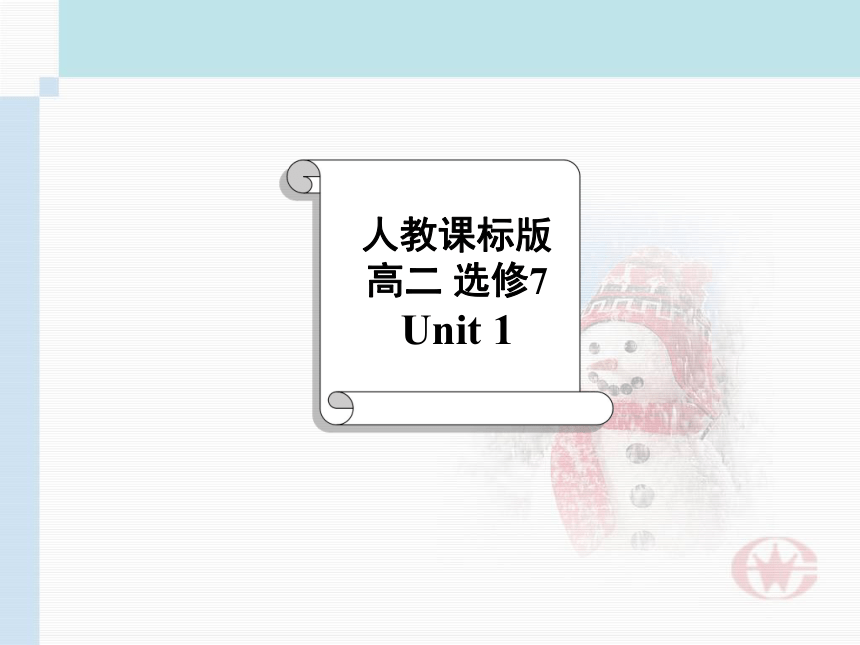 | |
| 格式 | zip | ||
| 文件大小 | 881.7KB | ||
| 资源类型 | 教案 | ||
| 版本资源 | 人教版(新课程标准) | ||
| 科目 | 英语 | ||
| 更新时间 | 2018-07-26 15:02:45 | ||
图片预览

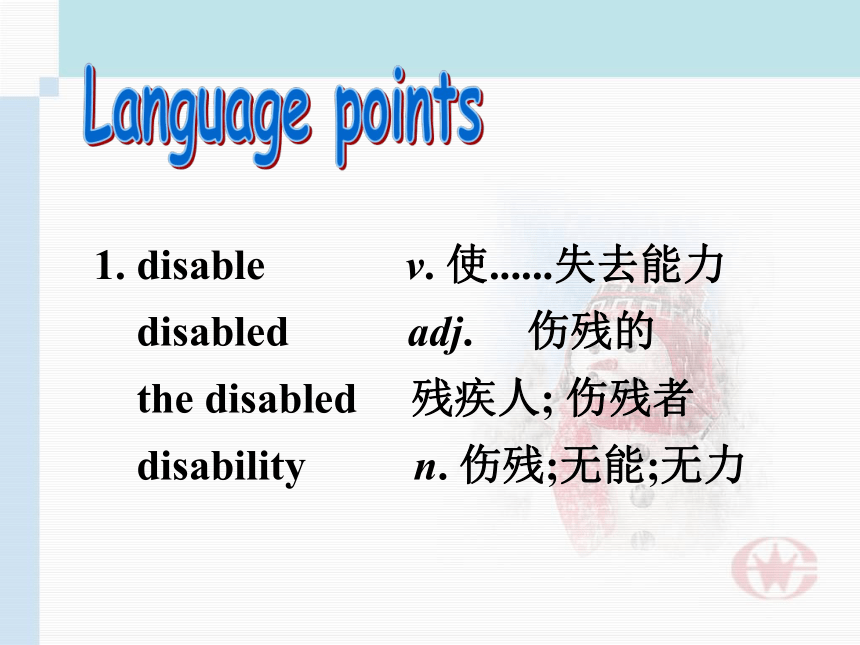

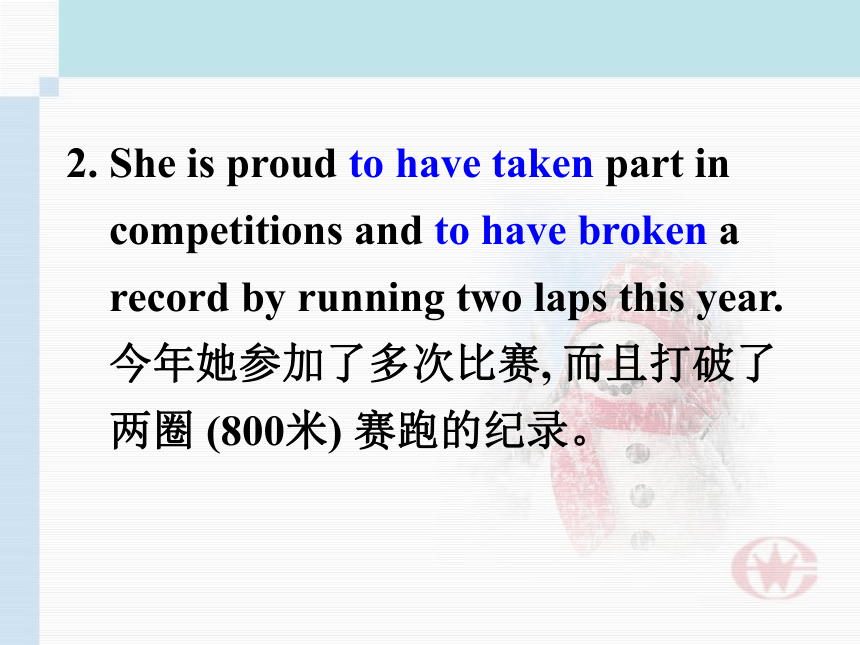
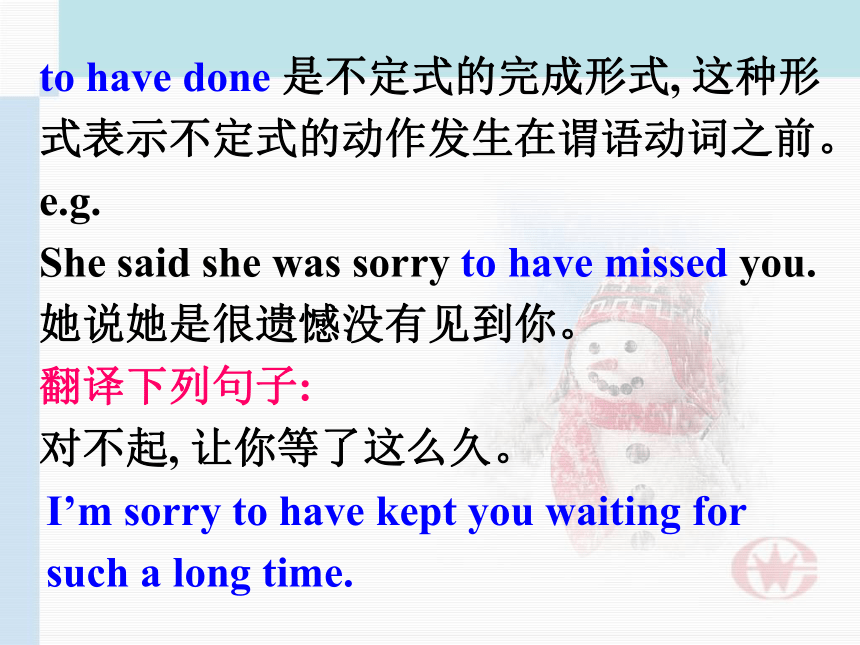
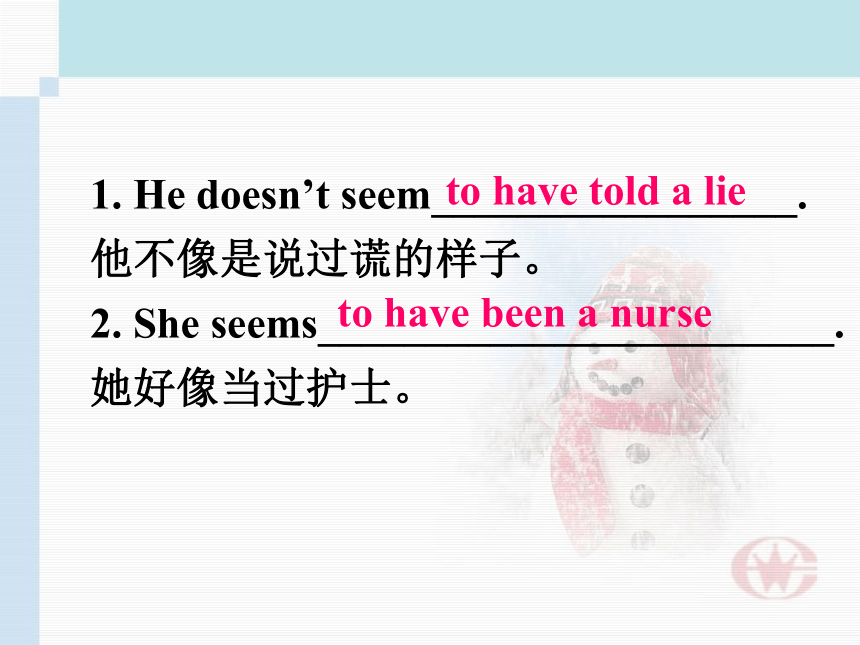
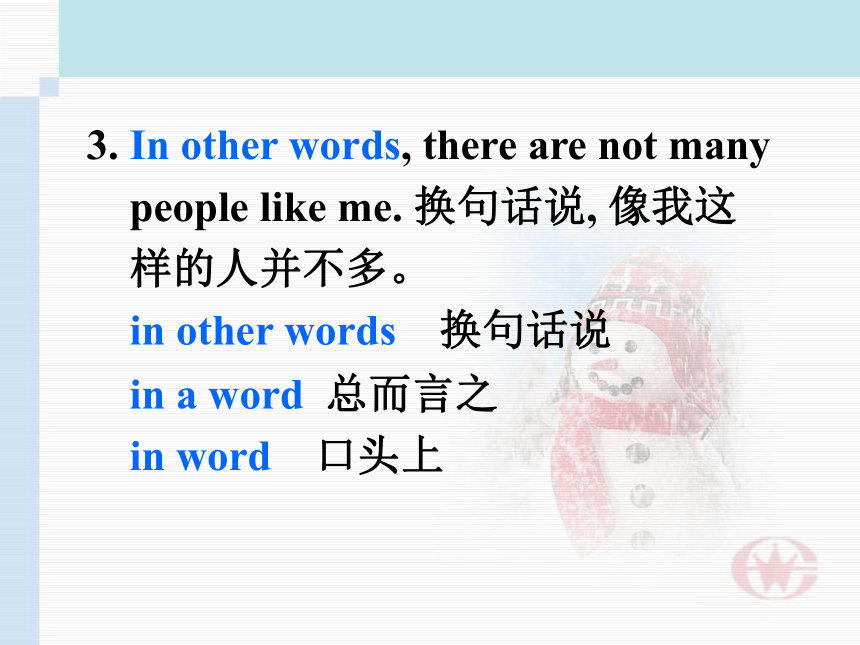



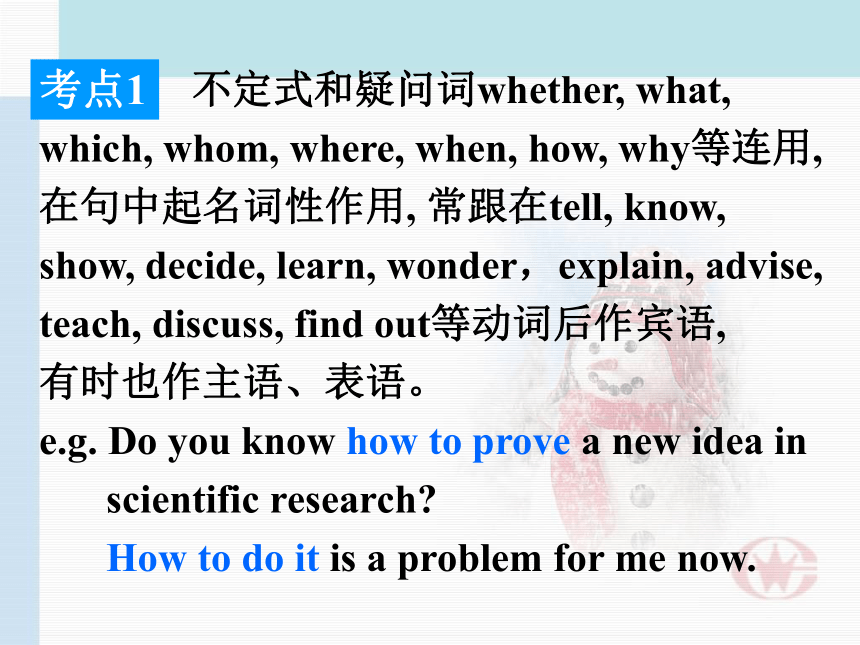
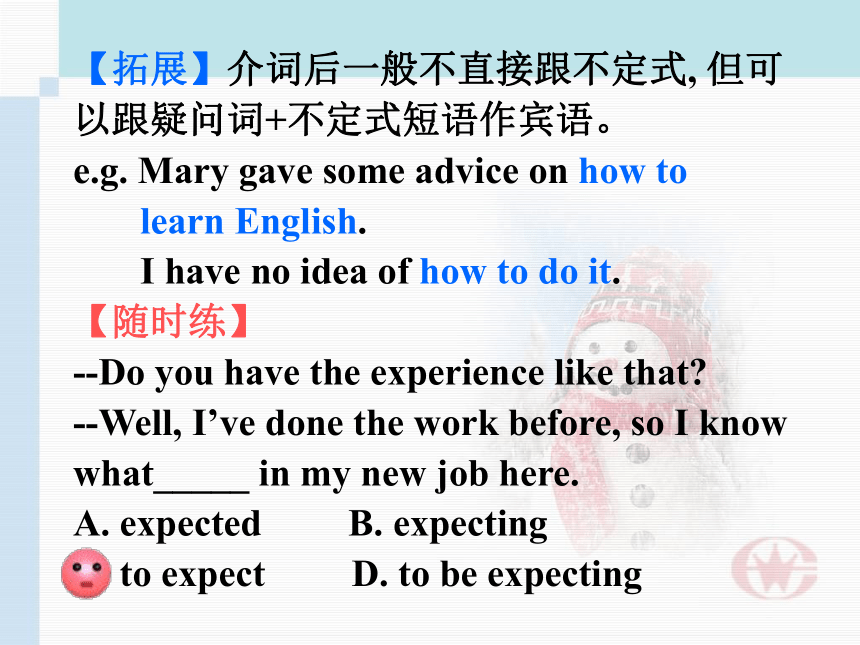
文档简介
课件46张PPT。人教课标版
高二 选修7
Unit 11. disable v. 使......失去能力
disabled adj. 伤残的
the disabled 残疾人; 伤残者
disability n. 伤残;无能;无力
Language points 用disable, disabled, disability的正确形式填空。
1. People come to agree that the _______ should also be treated with respect.
2. People with _________ should not be looked down upon.
3. The unexpected accident _______ her from undertaking heavy work.disableddisableddisabilitiesPractice2. She is proud to have taken part in competitions and to have broken a record by running two laps this year.
今年她参加了多次比赛, 而且打破了两圈 (800米) 赛跑的纪录。to have done 是不定式的完成形式, 这种形式表示不定式的动作发生在谓语动词之前。e.g.
She said she was sorry to have missed you. 她说她是很遗憾没有见到你。
翻译下列句子:
对不起, 让你等了这么久。I’m sorry to have kept you waiting for such a long time.1. He doesn’t seem_________________.
他不像是说过谎的样子。
2. She seems________________________.
她好像当过护士。to have told a lieto have been a nurse3. In other words, there are not many people like me. 换句话说, 像我这样的人并不多。
in other words 换句话说
in a word 总而言之
in word 口头上in plain words 率真地说
have a word with sb. 和某人谈谈
have words with sb. 和某人吵架
get in a word 插话
keep one’s word 守信用; 履行诺言I don’t have money or time, _______,
I can’t accompany you to the Great
Wall.
in a word B. in other words
C. in word D. in plain words小试牛刀4. Unfortunately, the doctors don’t know how to make me better, but I am very outgoing and have learned to adapt to my disability.
不幸的是, 大夫们不知道如何治好我的病, 但是我很开朗乐观, 学会了适应身体的残疾。 不定式和疑问词whether, what, which, whom, where, when, how, why等连用, 在句中起名词性作用, 常跟在tell, know, show, decide, learn, wonder,explain, advise, teach, discuss, find out等动词后作宾语,
有时也作主语、表语。
e.g. Do you know how to prove a new idea in scientific research? How to do it is a problem for me now.考点1【拓展】介词后一般不直接跟不定式, 但可以跟疑问词+不定式短语作宾语。 e.g. Mary gave some advice on how to
learn English. I have no idea of how to do it. 【随时练】
--Do you have the experience like that? --Well, I’ve done the work before, so I know what_____ in my new job here. A. expected B. expecting
C. to expect D. to be expecting adapt (oneself) to sth. 使某人适应……
adapt sth. for sth.
使适应, 使适合(新用途、新情况)
adapt sth. for sb.
为某人改编(改写) ……
be adapted from
根据……改编(改写)考点2 adapt...from...从......选取/改编
The play is _____________a novel.
这部电视剧是由小说改编而成的。 When he moved to Canada, the children __________________________
(很能适应变化)adapted to the change very well.adapted fromHave a try1) She found it difficult to _____ herself to the new surroundings.
A. adapt B. force
C. fit in D. change
2) These are English story books ____ Chinese students.
A. adapted from B. adapted for
C. adapted to D. adapting for adapt: 指修改或改变以适应新条件
adjust: 多指 “调整, 调节”使之适应
fit: 多指“大小适合”,引申为“吻合”
suit: 多指“合乎要求、口味、性格、情况”
match: 指“大小、色调、形状、性质”等相配或相称辨析: adapt, adjust, fit, suit, match1) You can’t see through the telescope until it is ________ to your eyes.
2) The shoes __ me well.
3) A red jacket doesn’t _____ green trousers.
4) No dish ____ all tastes.
5) You should _____ yourself to the new environment.adjustedfitmatchsuitsadaptPractice5. My motto is: live one day at a time.
我的座右铭是: 活一天算一天。
at a time 一次, 依次, 每次?
at one time (过去)有个时期, 一度, 曾经
e.g. The girl often eats one apple _______ now, but ___________she ate several apples in an hour. 现在这女孩经常 每次吃一个苹果, 但她曾经一个小时 吃了几个。at a timeat one time更多time短语:
at times 有时 at the same time 同时
at any time 随时?all the time 一直
in time 及时? on time 准时 ?
in no time 立刻 ahead of time 提前
from time to time 时不时?6. I used to climb trees, swim and play football. 我过去常常爬树、游泳和踢足球。
used to表示“过去常常做……”, 暗含现在已经这样做。
其否定式为used not to do sth. 或didn’t use to do sth.
used to do sth.的反意疑问句形式用usedn’t 或didn’t。e.g.
My father used to read newspapers
after breakfast.
There used to be a meeting on Monday,
didn’t/usedn’t there? You used to smoke, usedn’t you?/didn’t you?
used to与would
used to指过去的状况,也可指习惯,现在并非如此,而would多指过去动作的反复, 与现在无关。
He _________go to the park as soon as he was free.
He ____________be a naughty boy.wouldused toused to do, be used to sth./doing sth.和be used to do
used to表示过去经常发生的动作或存在的状态,但现在已不再发生或存在。
be used to sth./ doing sth. 表示“习惯于”
be used to sth. 意为“被用来做某事”The wood ____________make paper.
I’m ______________the cold weather.is used to getting used to小试牛刀用used 的相关短语完成句子。
The man has _________ living alone.
I _______ travel by train, but now by car.
What disease can the new medicine _________ deal with?got used to be used to used to 7. …, when I got out of breath after running a short way or had to stop ...
out of breath 上气不接下气, 喘不过?
e.g. Don’t make him carry such a heavy
box, or he will be____________. 别让他搬 那么重的箱子, 否则他会喘不过气的。
When he climbed to the top of the mountain, he was nearly_______________. 当他爬到山顶的时候, 几乎是上气不接下 气。out of breathout of breath关于breath的短语:
catch one’s breath 歇口气, 缓口气
hold one’s breath 屏住呼吸
above one’s breath 高声地
lose one’s breath 喘不过气来
recover one’s breath 缓过气来
waste one’s breath 白费口舌
take / draw a deep breath 深吸一口气8. … do not make me annoyed, …
annoy vt. 使不悦;惹怒;打扰
annoyed adj. (人)感到生气(恼怒)的
annoying adj. (事情)惹人生气的
annoyance n. 烦恼;烦扰
常用搭配:
be annoyed with sb. 对……感到生气
be annoyed for /at/about sth.
对……感到恼火
to sb’s annoyance 让某人恼火的是e.g. 这些苍蝇真使我心烦。
___________________________________
她看样子很烦恼。
___________________________________ 多丽安从不跟我生气。
___________________________________
他为此事很恼火。
___________________________________She looked annoyed.Dorian is never annoyed with me.He was annoyed about the matter.These flies are annoying me.9. All in all I have a good life. 总而言之, 我生活得挺好。
all in all 总而言之其他与all有关的短语:
in all 总共 after all 终究,毕竟
above all 首先;首要;最重要的
all alone 独自,独立地
all at once 突然,忽然,同时
at all 根本不, 一点也不1) _____, the party was a great success, for everyone there was very happy.
A. All in all B. Above all
C. In all D. After all
2) Children need many things, but _____ they need love.
A. the most important B. above all
C. to their satisfaction D. in general Practice10 . So don’t feel sorry for the disabled or make fun of them, and don’t ignore them either.
因此, 不要感到残疾人可怜, 或者取笑他们, 也不要瞧不起他们。 make fun of 取笑, 嘲笑
e.g.当同学们不能正确回答问题时, 我们不应该嘲笑他们。
We should not ______________the classmates when they can not answer the questions correctly.make fun of make fun of 用在被动语态结构时, 请不要漏掉介词 of 。?
e.g.没有人喜欢被嘲笑。
Nobody likes____________________.
【扩展】?
play a joke on sb. 开某人的玩笑
play a trick on sb. 捉弄某人being made fun of11. Why has his fellow students’ conduct changed towards Marty?
conduct vt. 指挥, 管理,进行,引导,传导(光、电等)
conduct sb. to some place 带领某人去某地
conduct sb. around some place 带领某人参观某地conduct /show ab. in/out 引领某人进来(出去)
conduct oneself 举止; 表现
conduct a survey/an experiment 进行调查(实验)
派生词:
conduction n. (热或电等能量的)传导; 输送
conductor n. 售票员; 管理者;指挥;导体小试牛刀1) He is respected by his colleagues because he always _____ himself well.
A. shows B. conducts
C. praises D. reflects
2) As is known to all, rubber does not ______ electricity.
A. conduct B. carry
C. take D. loadI. 根据下列各句句意及所给单词的首字母或汉语提示, 写出各单词的正确形式。
I spilt your coffee. Sorry — that was
_____ (笨拙的) of me.
2. Some people think children a____ to new environments more easily than adults.
3. John is the top student in our class and his m___ is “Work hard, play hard.”clumsyadaptmottoExercises4. The doctor was examining the blood samples under the __________ (显微镜) when he came in.
5. She was really ______ (愚蠢的) to give up such a good position.microscope stupid6. The little boy was anxious to join his f______ playing football in the playground.
7. You should buy some water _____ (缸) for your fish rather than keep them in the bowls.fellowstanksII. 用下列短语的正确形式填空。
adapt to adapt from in other words
make fun of after all out of breath
keep one’s word1) He has promised to help you and I’m sure he ________________.
2) This novel ____________________the Russian original for radio.will keep his wordhas been adapted from3) Don’t blame him too much. ________, he is a small child.?
4) It’s bad manners _____________ the disabled people.?
5) We ran so fast that we were ____________. After allto make fun ofout of breath6) He is quick __________ new circumstances.?
7) Your performance in the driving test didn’t reach the required standard— _____________, you failed.
to adapt toin other wordsIII. 根据括号内的提示将下列句子翻译 成英语。
他们请他走人, 也就是说, 他被解雇了。(in other words)
2. 我一路跑到学校, 上气不接下气。
(out of breath)They asked him to leave — in other words, he was fired.
I ran to the school all the way and was out of breath.3. 他有他的缺点, 但总的说来, 他是一个好孩子。(all in all)
4. 我不喜欢别人在公共场合取笑我。
(make fun of)He has his faults, but, all in all, he is a good child.
I hate being made fun of in public.5. 发现自己的建议被拒绝了他很失望。(find +宾补)
6. 为了确保煤气安全, 政府已经全面检查了城市的煤气供应系统。(不定式)He was disappointed to find his suggestions turned down.
To ensure the safety of gas, the government has checked the city’s gas supply system thoroughly.Thank you for listening!
高二 选修7
Unit 11. disable v. 使......失去能力
disabled adj. 伤残的
the disabled 残疾人; 伤残者
disability n. 伤残;无能;无力
Language points 用disable, disabled, disability的正确形式填空。
1. People come to agree that the _______ should also be treated with respect.
2. People with _________ should not be looked down upon.
3. The unexpected accident _______ her from undertaking heavy work.disableddisableddisabilitiesPractice2. She is proud to have taken part in competitions and to have broken a record by running two laps this year.
今年她参加了多次比赛, 而且打破了两圈 (800米) 赛跑的纪录。to have done 是不定式的完成形式, 这种形式表示不定式的动作发生在谓语动词之前。e.g.
She said she was sorry to have missed you. 她说她是很遗憾没有见到你。
翻译下列句子:
对不起, 让你等了这么久。I’m sorry to have kept you waiting for such a long time.1. He doesn’t seem_________________.
他不像是说过谎的样子。
2. She seems________________________.
她好像当过护士。to have told a lieto have been a nurse3. In other words, there are not many people like me. 换句话说, 像我这样的人并不多。
in other words 换句话说
in a word 总而言之
in word 口头上in plain words 率真地说
have a word with sb. 和某人谈谈
have words with sb. 和某人吵架
get in a word 插话
keep one’s word 守信用; 履行诺言I don’t have money or time, _______,
I can’t accompany you to the Great
Wall.
in a word B. in other words
C. in word D. in plain words小试牛刀4. Unfortunately, the doctors don’t know how to make me better, but I am very outgoing and have learned to adapt to my disability.
不幸的是, 大夫们不知道如何治好我的病, 但是我很开朗乐观, 学会了适应身体的残疾。 不定式和疑问词whether, what, which, whom, where, when, how, why等连用, 在句中起名词性作用, 常跟在tell, know, show, decide, learn, wonder,explain, advise, teach, discuss, find out等动词后作宾语,
有时也作主语、表语。
e.g. Do you know how to prove a new idea in scientific research? How to do it is a problem for me now.考点1【拓展】介词后一般不直接跟不定式, 但可以跟疑问词+不定式短语作宾语。 e.g. Mary gave some advice on how to
learn English. I have no idea of how to do it. 【随时练】
--Do you have the experience like that? --Well, I’ve done the work before, so I know what_____ in my new job here. A. expected B. expecting
C. to expect D. to be expecting adapt (oneself) to sth. 使某人适应……
adapt sth. for sth.
使适应, 使适合(新用途、新情况)
adapt sth. for sb.
为某人改编(改写) ……
be adapted from
根据……改编(改写)考点2 adapt...from...从......选取/改编
The play is _____________a novel.
这部电视剧是由小说改编而成的。 When he moved to Canada, the children __________________________
(很能适应变化)adapted to the change very well.adapted fromHave a try1) She found it difficult to _____ herself to the new surroundings.
A. adapt B. force
C. fit in D. change
2) These are English story books ____ Chinese students.
A. adapted from B. adapted for
C. adapted to D. adapting for adapt: 指修改或改变以适应新条件
adjust: 多指 “调整, 调节”使之适应
fit: 多指“大小适合”,引申为“吻合”
suit: 多指“合乎要求、口味、性格、情况”
match: 指“大小、色调、形状、性质”等相配或相称辨析: adapt, adjust, fit, suit, match1) You can’t see through the telescope until it is ________ to your eyes.
2) The shoes __ me well.
3) A red jacket doesn’t _____ green trousers.
4) No dish ____ all tastes.
5) You should _____ yourself to the new environment.adjustedfitmatchsuitsadaptPractice5. My motto is: live one day at a time.
我的座右铭是: 活一天算一天。
at a time 一次, 依次, 每次?
at one time (过去)有个时期, 一度, 曾经
e.g. The girl often eats one apple _______ now, but ___________she ate several apples in an hour. 现在这女孩经常 每次吃一个苹果, 但她曾经一个小时 吃了几个。at a timeat one time更多time短语:
at times 有时 at the same time 同时
at any time 随时?all the time 一直
in time 及时? on time 准时 ?
in no time 立刻 ahead of time 提前
from time to time 时不时?6. I used to climb trees, swim and play football. 我过去常常爬树、游泳和踢足球。
used to表示“过去常常做……”, 暗含现在已经这样做。
其否定式为used not to do sth. 或didn’t use to do sth.
used to do sth.的反意疑问句形式用usedn’t 或didn’t。e.g.
My father used to read newspapers
after breakfast.
There used to be a meeting on Monday,
didn’t/usedn’t there? You used to smoke, usedn’t you?/didn’t you?
used to与would
used to指过去的状况,也可指习惯,现在并非如此,而would多指过去动作的反复, 与现在无关。
He _________go to the park as soon as he was free.
He ____________be a naughty boy.wouldused toused to do, be used to sth./doing sth.和be used to do
used to表示过去经常发生的动作或存在的状态,但现在已不再发生或存在。
be used to sth./ doing sth. 表示“习惯于”
be used to sth. 意为“被用来做某事”The wood ____________make paper.
I’m ______________the cold weather.is used to getting used to小试牛刀用used 的相关短语完成句子。
The man has _________ living alone.
I _______ travel by train, but now by car.
What disease can the new medicine _________ deal with?got used to be used to used to 7. …, when I got out of breath after running a short way or had to stop ...
out of breath 上气不接下气, 喘不过?
e.g. Don’t make him carry such a heavy
box, or he will be____________. 别让他搬 那么重的箱子, 否则他会喘不过气的。
When he climbed to the top of the mountain, he was nearly_______________. 当他爬到山顶的时候, 几乎是上气不接下 气。out of breathout of breath关于breath的短语:
catch one’s breath 歇口气, 缓口气
hold one’s breath 屏住呼吸
above one’s breath 高声地
lose one’s breath 喘不过气来
recover one’s breath 缓过气来
waste one’s breath 白费口舌
take / draw a deep breath 深吸一口气8. … do not make me annoyed, …
annoy vt. 使不悦;惹怒;打扰
annoyed adj. (人)感到生气(恼怒)的
annoying adj. (事情)惹人生气的
annoyance n. 烦恼;烦扰
常用搭配:
be annoyed with sb. 对……感到生气
be annoyed for /at/about sth.
对……感到恼火
to sb’s annoyance 让某人恼火的是e.g. 这些苍蝇真使我心烦。
___________________________________
她看样子很烦恼。
___________________________________ 多丽安从不跟我生气。
___________________________________
他为此事很恼火。
___________________________________She looked annoyed.Dorian is never annoyed with me.He was annoyed about the matter.These flies are annoying me.9. All in all I have a good life. 总而言之, 我生活得挺好。
all in all 总而言之其他与all有关的短语:
in all 总共 after all 终究,毕竟
above all 首先;首要;最重要的
all alone 独自,独立地
all at once 突然,忽然,同时
at all 根本不, 一点也不1) _____, the party was a great success, for everyone there was very happy.
A. All in all B. Above all
C. In all D. After all
2) Children need many things, but _____ they need love.
A. the most important B. above all
C. to their satisfaction D. in general Practice10 . So don’t feel sorry for the disabled or make fun of them, and don’t ignore them either.
因此, 不要感到残疾人可怜, 或者取笑他们, 也不要瞧不起他们。 make fun of 取笑, 嘲笑
e.g.当同学们不能正确回答问题时, 我们不应该嘲笑他们。
We should not ______________the classmates when they can not answer the questions correctly.make fun of make fun of 用在被动语态结构时, 请不要漏掉介词 of 。?
e.g.没有人喜欢被嘲笑。
Nobody likes____________________.
【扩展】?
play a joke on sb. 开某人的玩笑
play a trick on sb. 捉弄某人being made fun of11. Why has his fellow students’ conduct changed towards Marty?
conduct vt. 指挥, 管理,进行,引导,传导(光、电等)
conduct sb. to some place 带领某人去某地
conduct sb. around some place 带领某人参观某地conduct /show ab. in/out 引领某人进来(出去)
conduct oneself 举止; 表现
conduct a survey/an experiment 进行调查(实验)
派生词:
conduction n. (热或电等能量的)传导; 输送
conductor n. 售票员; 管理者;指挥;导体小试牛刀1) He is respected by his colleagues because he always _____ himself well.
A. shows B. conducts
C. praises D. reflects
2) As is known to all, rubber does not ______ electricity.
A. conduct B. carry
C. take D. loadI. 根据下列各句句意及所给单词的首字母或汉语提示, 写出各单词的正确形式。
I spilt your coffee. Sorry — that was
_____ (笨拙的) of me.
2. Some people think children a____ to new environments more easily than adults.
3. John is the top student in our class and his m___ is “Work hard, play hard.”clumsyadaptmottoExercises4. The doctor was examining the blood samples under the __________ (显微镜) when he came in.
5. She was really ______ (愚蠢的) to give up such a good position.microscope stupid6. The little boy was anxious to join his f______ playing football in the playground.
7. You should buy some water _____ (缸) for your fish rather than keep them in the bowls.fellowstanksII. 用下列短语的正确形式填空。
adapt to adapt from in other words
make fun of after all out of breath
keep one’s word1) He has promised to help you and I’m sure he ________________.
2) This novel ____________________the Russian original for radio.will keep his wordhas been adapted from3) Don’t blame him too much. ________, he is a small child.?
4) It’s bad manners _____________ the disabled people.?
5) We ran so fast that we were ____________. After allto make fun ofout of breath6) He is quick __________ new circumstances.?
7) Your performance in the driving test didn’t reach the required standard— _____________, you failed.
to adapt toin other wordsIII. 根据括号内的提示将下列句子翻译 成英语。
他们请他走人, 也就是说, 他被解雇了。(in other words)
2. 我一路跑到学校, 上气不接下气。
(out of breath)They asked him to leave — in other words, he was fired.
I ran to the school all the way and was out of breath.3. 他有他的缺点, 但总的说来, 他是一个好孩子。(all in all)
4. 我不喜欢别人在公共场合取笑我。
(make fun of)He has his faults, but, all in all, he is a good child.
I hate being made fun of in public.5. 发现自己的建议被拒绝了他很失望。(find +宾补)
6. 为了确保煤气安全, 政府已经全面检查了城市的煤气供应系统。(不定式)He was disappointed to find his suggestions turned down.
To ensure the safety of gas, the government has checked the city’s gas supply system thoroughly.Thank you for listening!
